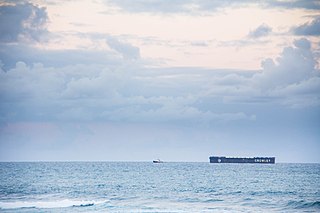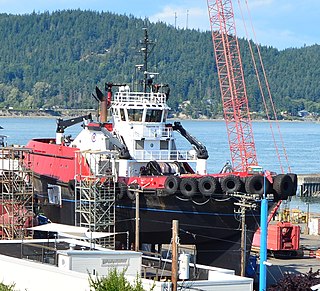Related Research Articles

The Exxon Valdez oil spill occurred in the Prince William Sound, Alaska, on March 24, 1989. Exxon Valdez, an oil supertanker owned by Exxon Shipping Company bound for Long Beach, California struck Prince William Sound's Bligh Reef, 1.5 mi (2.4 km) west of Tatitlek, Alaska at 12:04 a.m. and spilled 10.8 million US gallons (257,000 bbl) of crude oil over the next few days.

Valdez is a city in the Chugach Census Area in the U.S. state of Alaska. According to the 2020 US Census, the population of the city is 3,985, up from 3,976 in 2010. It is the third most populated city in Alaska's Unorganized Borough.

Oriental Nicety, formerly Exxon Valdez, Exxon Mediterranean, SeaRiver Mediterranean, S/R Mediterranean, Mediterranean, and Dong Fang Ocean, was an oil tanker that gained notoriety after running aground in Prince William Sound, spilling its cargo of crude oil into the sea. On March 24, 1989, while owned by the former Exxon Shipping Company, captained by Joseph Hazelwood and First Mate James Kunkel, and bound for Long Beach, California, the vessel ran aground on the Bligh Reef, resulting in the second largest oil spill in United States history. The size of the spill is estimated to have been 40,900 to 120,000 m3. In 1989, the Exxon Valdez oil spill was listed as the 54th largest spill in history.

The Alyeska consortium refers to the major oil companies that own and operate the Trans-Alaska Pipeline System (TAPS) through the Alyeska Pipeline Service Company.

The Oil Pollution Act of 1990 (OPA) was passed by the 101st United States Congress and signed by President George H. W. Bush. It works to avoid oil spills from vessels and facilities by enforcing removal of spilled oil and assigning liability for the cost of cleanup and damage; requires specific operating procedures; defines responsible parties and financial liability; implements processes for measuring damages; specifies damages for which violators are liable; and establishes a fund for damages, cleanup, and removal costs. This statute has resulted in instrumental changes in the oil production, transportation, and distribution industries.
Joseph Jeffrey Hazelwood was an American sailor. He was the captain of Exxon Valdez during her 1989 oil spill. He was accused of being intoxicated which contributed to the disaster, but was cleared of this charge at his 1990 trial after witnesses testified that he was sober around the time of the accident. Hazelwood was convicted of a lesser charge, negligent discharge of oil, fined $50,000, and sentenced to 1,000 hours of community service.
The Valdez Blockade was a 1993 protest by Cordova fishermen who blockaded the Valdez Narrows in an attempt to obtain funding for research and restoration efforts relating to decreasing yields of pink salmon and herring in Prince William Sound following the Exxon Valdez Oil Spill. The fishermen were dissatisfied with the Exxon Valdez Oil Spill Trustee’s Council’s refusal to fund research efforts into the spill's effects on the fish. The blockade lasted three days, from August 20 to August 22. The blockade ended when Secretary of the Interior, Bruce Babbitt, promised funding for salmon and herring research. Findings from these studies resulted in additional compensation from Exxon.
A double hull is a ship hull design and construction method where the bottom and sides of the ship have two complete layers of watertight hull surface: one outer layer forming the normal hull of the ship, and a second inner hull which is some distance inboard, typically by a few feet, which forms a redundant barrier to seawater in case the outer hull is damaged and leaks.

Crowley, legally Crowley Maritime Corporation, is based in Jacksonville, Florida. Founded in 1892, Crowley is primarily a family- and employee-owned vessel management, owner, and supply chain logistics services company, providing services globally. As of July 2016, Crowley was ranked as the 13th largest private company in Florida, employing approximately 5,300 people worldwide with revenues of $2.2 billion. It provides its services using a fleet of more than 300 vessels, consisting of RO-RO vessels, LO-LO vessels, tankers, Articulated Tug-Barges (ATBs), tugs and barges. Crowley's land-based facilities and equipment include terminals, warehouses, tank farms, and specialized vehicles.

Philly Shipyard, formerly Aker Philadelphia Shipyard, is a commercial shipyard located in Philadelphia, Pennsylvania, United States on part of the site of the Philadelphia Naval Shipyard. The commercial yard began after the United States Navy had ended most of its operations at the site.

Trident Seafoods is the largest seafood company in the United States. It is based in Seattle, Washington. It manages a network of fishing ships, processing plants, and a vertically integrated distributorship of its products. It sells frozen, canned, smoked and ready-to-eat seafood products for the wholesale, retail and food service markets under a variety of different brand names. Many crab boats seen in the Deadliest Catch TV series are affiliated with Trident.

An oil tanker, also known as a petroleum tanker, is a ship designed for the bulk transport of oil or its products. There are two basic types of oil tankers: crude tankers and product tankers. Crude tankers move large quantities of unrefined crude oil from its point of extraction to refineries. Product tankers, generally much smaller, are designed to move refined products from refineries to points near consuming markets.

Tan'erliq is a ship escort, rescue and oil response oceangoing tugboat operated by Crowley Maritime and stationed in Prince William Sound, Alaska. In addition to Tan'erliq, her sister ship Nanuq is also stationed in Valdez, Alaska.

Dead Ahead: The Exxon Valdez Disaster is a 1992 movie depicting the Exxon Valdez oil spill disaster off the coast of Alaska. Directed by Paul Seed, it stars Christopher Lloyd, John Heard, Rip Torn and Michael Murphy.
Oil spill governance in the United States is governed by federal law.
International Bird Rescue is a nonprofit organization that rehabilitates injured aquatic birds, most notably seabirds affected by oil spills. Founded by Alice Berkner and members of the Ecology Action, including veterinarian James Michael Harris, D.V.M. in 1971 and based in Cordelia, California, the group has developed scientifically-based bird rehabilitation techniques and has led oiled wildlife rescue efforts in more than 200 oil spills worldwide, including the 1989 Exxon Valdez oil spill in Prince William Sound, Alaska, and the 2010 Deepwater Horizon oil spill in the Gulf of Mexico, where International Bird Rescue co-managed oiled bird rehabilitation efforts in four states with Tri-State Bird Rescue and Research.

Riki Ott is a marine toxicologist and activist in Cordova, Alaska. Ott was frequently introduced as an "oil spill expert" in her many media appearances during the height of the 2010 BP Deepwater Horizon oil spill news coverage. After graduating with a doctorate in sedimentary toxicology from the University of Washington, Ott moved to Alaska and started a fishing business. When the Exxon Valdez oil spill disrupted the local fishing-based economy, she became an environmental activist. Since the spill, she has participated in legal and public relations disputes with the Exxon company.
The Prince William Sound Regional Citizens' Advisory Council is an independent non-profit organization based in Anchorage and Valdez, Alaska, whose mission is to promote the environmentally-safe operation of the Alyeska Pipeline's Valdez Marine Terminal and associated oil tankers, and to inform the public of those activities.

As the world's largest majority investor-owned oil and gas corporation, ExxonMobil has received significant amounts of controversy and criticism, mostly due to its activities which increase the speed of climate change and its denial of global warming.

Walter Bruce "Walt" Parker was an American civil servant, policy adviser, transportation adviser, academic and local politician. Parker's career focused on the development of natural resources, transportation and infrastructure in Alaska from the 1940s to the 2000s. In 1989, Alaska Governor Steve Cowper appointed Parker as the chairman of the Alaska Oil Spill Commission, which investigated the Exxon Valdez oil spill. He is credited with making important contributions to the fields of transportation, telecommunications, education, land use and urban planning within the state of Alaska. Parker was inducted into the Alaska Conservation Hall of Fame by the Alaska Conservation Foundation in 2002 for his contributions to state conservation.
References
- ↑ Nolte, Carl (11 August 1993). "Bay's Battle of the High-Tech Tugboats". San Francisco Chronicle: A15.
- ↑ Whitney, David (16 December 1994). "EXXON SEEKS TAX DOLLARS FOR TANKER". Anchorage Daily News: D1.
- ↑ Whitney, David (5 April 1996). "EXXON WANTS NOTORIOUS TANKER BACK ON DUTY IN ALASKA WATERS". Anchorage Daily News: A1.
- ↑ Phillips, Natalie (18 June 1998). "OIL TANKER STILL BARRED FROM SOUND JUDGE REFUSES TO REMOVE RESTRICTION ON EXXON VALDEZ". Anchorage Daily News: B1.
- ↑ "ExxonMobil U.S. Marine Affiliate Announces Plan for Two New Tankers". Business Wire. 25 July 2011.